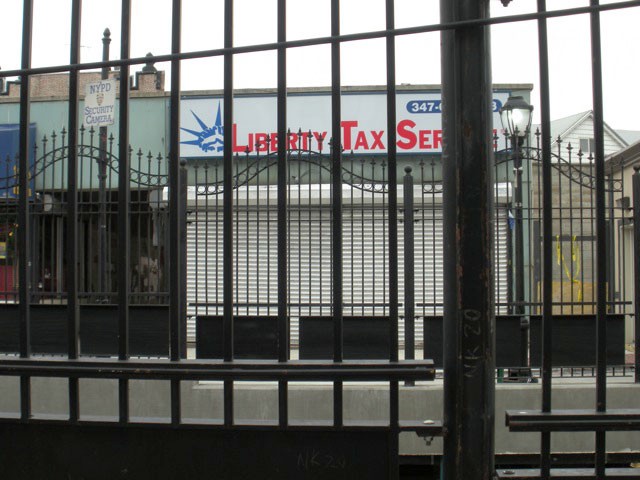Bombing Libya: The Anniversary
25 years ago today, the United States was bombing Libya. How things change!
Liquor

17. Schnapps
16. Whatever you’ve got
15. Pisco
14. Pure grain alcohol
13. Cachaça
12. Misc. anise-flavored liqueurs (Sambuca, Anisette, Ouzo, etc.)
11. Rum
10. Tequila
9. Misc. amari (Fernet, Carciofo, Rabarbaro, etc.)
8. Misc. brandy (grappa, eau de vie, marc, etc.)
7. Armagnac
6. Cognac
5. Vodka
4. Gin
3. Misc. whiskey (Irish, Scotch, Japanese, regional American, etc.)
2. Rye
1. Bourbon
Photo by quinnanya, from Flickr.
Obvious Joke About Air Traffic Controllers
Thank goodness the nation’s few remaining lone nightshift air traffic controllers are now being forced to work in pairs. Everyone hates drinking alone.
Scott Walker Gravely Concerned About Workers' Health Care Costs

Here is Wisconsin Governor Scott Walker’s testimony today at the House’s hearing on state’s debt — while a judge was ruling that Dane County doesn’t have standing to sue the state
over Walker’s bill that limits collective bargaining. Walker, or as Wonkette calls him, “the Koch Brothers’ dumb little whore from Wisconsin,” was not there to talk about how the Wisconsin state assembly voided an ordinance this week that ensured five whole sick days a year to employees of companies that had 10 or more staff. No, he went forth to rail about the high cost of health insurance born by private workers! Yes. He did. He is really concerned that factory workers and the middle class pay “anywhere from 15% to 50% of their health insurance premium costs.” His brother, too! They would “love a deal like the one I offered government workers,” Walker said. Gee whiz. Hmm. If only there were some way to organize working people, so that they could help get their health insurance costs down. I just can’t think of how….
Anyway: it gets better.
Local Gay Upset About Near-Death of Camp
“A couple of Sundays ago I had a gnarly mood swing in front of the telly. It happened while Kate Winslet was frowning and mumbling her way through the third episode of Mildred Pierce, the HBO miniseries directed by Todd Haynes…. Clearly there is a conspiracy afoot to deprive us all of the one thing that can make life bearable. Something must be done to protect and promote the endangered majesty of camp.”
— Homosexual Puts Foot Down, Cries Enough!
The Best Newspaper Staff Game in Town
There is something going on that is totally awesome but that none of us will ever really know how it ends, and so it is also sad. New Observer editor Elizabeth Spiers not long ago assigned her staff to report profiles of a coworker, as an exercise (or as an evaluation?) and many people there are taking it dead serious, which is great. Like, people are asking their coworkers about finances and grilling their friends and acquaintances and basically calling up their parents. And reading everything they’ve ever written. This has the opportunity to tear the office apart and/or unite it! Or both, and likely in a good way! So fun, so dramatic, so living on the edge. You can learn so much about people by how they behave in this situation. It’s like a game of Clue! Or a little like that Stanford prison experiment! Best idea ever.
Some Lucky Bears Are Making Energy Drinks Now
Despite the dazzling promotional copy I think I’m going to pass on this one: “Bear Semen is the Manliest Drink on Earth. This drink won’t just give you a hairy chest, this drink will give you hairy eyeballs. Simply buying this drink will make you the most manly man in a hundred mile radius, even if you are a woman.”
Three Poems by Leora Fridman
by Mark Bibbins, Editor
Peepers
Troops scatter about
an alien surface. Where does this
temperature stack up against
the ice age? What sounds
do my gnawing teeth
make? We watch morning
flake. It’s a forward march
into the gleaming future
and it’s the rancid
bananas that keep us
from getting depressed.
I help to stabilize supplies.
What will I be able to crush next?
You can ski inside of me,
baby. I’m that kind of
brass. My finger-tips like
swinging in the low cloud,
learning about crystal stuffs.
They inflate but don’t thin. I radio out
for new nails and provisions, new
wandering tribes that will
meet us for gruel, carrying
their ancestral knowledge
back. They can’t crush what’s under
us or what melts. The general of my
floe troops has struck
fear into the hearts of
peepholes simply by
carrying snow. He doesn’t
hurt anyone. He fouls
up his aim on the regular.
It’s a grace he has in him,
letting peepers slip away.
Awning
I’ve roped myself
out of another one.
I’ve left my favorite dress behind.
The way we move from crash to crash
is like springing beasts, and I can’t take
credit for the forward march.
I allow myself this gravity
because I think it makes others
feel welcome. You know, we can’t always
be discussing our latest greatest find.
Down by the old accident there are those
nice people without hope. They can spell
out everything they’re feeling
without the help of poise.
They can see until the river bends.
We like one another when I am
piecing my dress back together.
They feel my pain.
They know what it is like
to keep stitching in the name
of dumb faith. That always
renewing stoppage. That falling
on the top of what’s
next, blocking its boring
vegetable fame.
Nobody thinks they are going
to get anywhere,
just the pure blank doing,
a floating marquee
on the stream.
Substantial Presence Test
At ten he snuck his father’s Alien-
Resident card and waved it in
diagonals, “see,” he said, his father
had been bald from the age of twenty,
“the shine. He must actually be
from outer space.” We walked by three red
marbled revolutionaries. He felt finite
to me. He vomited later, by
a cricket-themed park. I vowed to
shop only in those dusty markets,
those particular cans,
to keep my kitchens stacking
like home. He felt adhered
to me. I’d take him home if all
immigrants had beady
antennae. It was a city-
wide green space, it was
a clean-up of remains.
Leora Fridman is a writer, translator and educator living in Massachusetts. Her recent and forthcoming publications are included in Denver Quarterly, Shampoo, H_NGM_N, Everyday Genius, and others.
For more poetry, visit The Poetry Section’s vast archive. You may contact the editor at poems@theawl.com.
Victim Testifies
The victim in the NYC cop rape case, which we’ve been following, testified in court today.
Liberty Tax Service: Your Huddled Masses Yearning To Be Franchisees

It’s as sure a sign of the arrival of Spring as the tulips peeking and the peepers peeping and the open-toed shoes. We’ve all seen them. People, dressed in powder-blue frocks and Styrofoam hats, frolicking at the strip mall turn-in and at the high-traffic urban business district. And they’re cheery, genuinely cheery, like children on Christmas morning, or an I-banker reckoning his bonus. They are dressed like the Statue of Liberty. Sometimes they have boomboxes, the kind that you can change the batteries yourself, and they jam tunes.
Meet the new working class: seasonal temps paid to gambol like dystopic Care Bears in cheap national monument costumes.
We’re not unfamiliar with the entry-level marketing employee — the sandwich-board wearers, the handers-out of pamphlets, the guys who stand in front of the mall propping up the FINAL CLOSE-OUT signs, now or historically. It’s a sad truth that not all jobs are awesome (that’s why they call them ‘jobs’). But these street teams are different. There’s no sullen resignation, no tired shuffle. These L’il Statues display the enthusiasm we expect from the Junior Varsity Cheerleading Squad’s car-wash fundraiser. They are confounding. Surely they can’t be paid enough to be that happy?
These dancing statues are employed by Liberty Tax Service. Liberty Tax Service is a growth industry, a storefront paid tax preparation concern. Think about that: the L’il Statues that are endemic in less-advantaged neighborhoods and newly sketchy suburban business areas are employed, not by a children’s TV show, not by a used car salesman, not by a AAA baseball team, but by a storefront tax preparation concern.
That is something like alarming, but with a dash of sinister and then dumped into a simmering pot of OMG.
***
Liberty Tax Service was founded in 1997 by John Hewitt, who’d been bought out of his previous tax prep concern, Jackson Hewitt. He opened stores in Canada until his non-compete expired in 1999, whereupon he began to open stores in the U.S. as well. Objectively, LTS is a success, already third in the market after roughly a decade in business. According to the most recent available Annual Report (warning: pdf) from 2009, in the past nine years LTS has increased the number of LTS offices by 600%, and revenue by 800%. That is a meteoric rise (if we can imagine a meteor in reverse). Granted the field of storefront tax prep has not had the easiest go of it, competing both with online tax prep software and with whispers of regulation of Rapid Refunds (more on that in a bit), but LTS is now snapping at the heels of big boys H&R; Block and the aforementioned Jackson Hewitt, in a very short time.
These are tax services that are aimed at a specific demographic, a customer base that hits the strip malls and walks the high-traffic districts. Let’s call the demo mid- to down-market, a call based purely on the locations of LTS. The clients of LTS most likely do not own businesses or have investment portfolios, and they are probably not subject to the alternative minimum tax. Clients like that have a CPA. Accordingly, the rates charged by LTS (and its competitors) are less than the rates charged by, say, a CPA.
Well, we assume so. The fee structure of LTS is a bit of a mystery. It’s tough to say from the
website, which makes no mention. Tougher yet to say if you stop by the actual stores. “What you have to do is you can come in for a free consultation,” a preparer in Manhattan told me. A young man in Brooklyn was more forthcoming. In order to give me a quote, “we would have to put your info in the system.” That’s a sales tactic that’s not without pressure. “Generally, it’s around $150 for the simplest returns,” he added. Assuming a certain canny optimism in that quote, let’s say that the LTS fee structure is comparable to the leading tax prep firms, both of whom report their average fees ($189 and $209). Let’s give the benefit of the doubt.
The services offered by LTS exceed the services of one of the proprietary e-filing services offered by the Internet only inasmuch as the customer interfaces with a human being. It’s not tax-planning; it’s data entry. So if the customer is in a position where $150 is worth the time the customer would have to spend utilizing one of the e-services, LTS makes a lot of sense. Which to say that unless the customer makes a hundred bucks an hour or so, or has a heightened phobia of filling out a 1040EZ, LTS makes little sense. Though who are we to put a price on convenience? Maybe, for the down-market tax filer, a couple days’ worth of wages is not too much to pay for the comfort of, at the very least, perceived expertise.

Tax preparation is not the only service offered by LTS. They also offer Refund Anticipation Loans. The mechanism is that a LTS arranges a loan from a third-party bank equal to the amount of a potential refund. When the refund arrives, the customer then remits the refund to the bank, and the loan is repaid. If that happens, then the fees are nominal, less than $100. However, if the customer somehow fails to hand over the refund in a timely manner, then a crazy-high APR kicks in and the real money is made. RALs are of a kind with payday lenders, rent-to-own centers and pawn shops — they specifically target low-income consumers, which is why regulation of RALs has long been lobbied for (and is slowly easing in). RALs may become a thing of the past — H&R; Block had to stop offering them when regulators forbid their bank from funding them — but they remain a cornerstone of LTS’s appeal.
Speaking of which: for a burgeoning tax prep empire, LTS is outwardly, for lack of a kind word, shabby. The storefronts speak very directly to a depressed commercial real estate market — they have a lived-in quality that is out-of-place in the world of bright and shiny franchises. This is to say that LTS occupies, in a quickly and cheaply realized fashion, spaces formerly occupied by businesses — businesses that pulled up stakes. Think banner signage, fading; think institutional office furniture; think beige paint. These are not the trappings of the national chains that we expect: custom-manufactured signage and identifiable architectural flourishes. What LTS shows is evidence of the temporary and the opportunistic, a temporary autonomous zone stood on its head until the change falls out of its pockets.
* * *
The membership of LTS in the sad list of storefront businesses designed to make money from the less well-off is not (exclusively) what makes LTS worth talking about. LTS may appear to be a paid tax-prep service, but more accurately, LTS is a paid tax-prep franchisor. That may seem like a little difference but it’s actually a big one.
A subset of the world of small business, franchising is a business arrangement whereby the franchisee is purchasing the right to conduct business in the name of the franchise. This can be a simple license of the right to use the tradename and associated intellectual property of the franchise, or it can be a very complex relationship with ongoing support and involvement of the franchise. Think for example of the fast-food industry: the chances are good that your local Burger King is not owned and operated by Burger King Corporation but rather by an independent franchisee. “Independent” can be misleading — the consistency and sameness of all the franchised BKs is tightly controlled by the corporate parent, by the training systems in place for new franchise operators, by corporate control of the supply and marketing of the individual BK, and mostly by the franchising agreement, which stipulates not only what not to do, but what must absolutely be done.
On a scale that runs from simple IP license to total control, as a franchiser LTS falls somewhere in the middle. LTS offers use of their proprietary tax prep software and training for owners and preparers (“certification,” they call it). LTS also mandates certain advertising and marketing, though they do not control it as tightly as, say, Burger King. In the world of franchising, in the websites and magazines and message boards devoted to it (franchisees, or “Zees,” are not unlike fanboys in this regard), LTS is thought of as a good opportunity for the beginner Zee. It’s said to have a focus on expansion and reasonable start-up costs (in-house financing available). On the other hand, financing comes with a typical APR of 12%, and LTS has a reputation as a strict enforcer of the franchise agreement when a Zee missteps.
LTS also offers an additional option to the Zee: becoming an “area developer,” the person responsible for gathering Zees in a specific region. So it’s not just a franchise but a franchise with an additional layer to it. The middle layer, the area developer, acts as a sub-franchiser, while kicking back start-up fees and royalties to the top layer. This is a feature most often associated with Multi-Level Marketing (think Amway). Here LTS creates an engine that self-replicates, provides the tax-prep software and the training, and then collects money. And it’s an engine designed to appeal to the self-reliance of those that have been left behind (or those for whom opportunity has not yet knocked).
Do note that the literature of LTS devotes a great number of words and pictures to excellence of service and similar virtues, and that Hewitt is personally a pioneer in the development of tax-preparation software. But voracious growth and MLM structuring are warning signs to the savvy Zee, and LTS is very direct about recruiting potential Zees — visiting their website (say, looking into their services and unseen fee schedule), and the visitor can’t help but notice, right there on the main page, a series of entreaties to Become A Franchisee!
Franchise fees, royalties and advertising fees from Zees make up a half of LTS’s revenue. Services offered customers represent less than a third of revenue. Note that “royalties” would actually cover services offered to customers by Zees, but the line item covering royalty income is actually commingled with the advertising fee income, which is why trying to read a financial statement can be as troublesome as reading a statistic. The point is that LTS is, profit-wise, more in the business of franchising than they are in the business of tax preparation. They are selling opportunity, or at least the illusion thereof.
* * *
But what of the L’il Statues that first attracted our attention? They’re not relatives of the Zee, lending a hand. They’re actually part of the marketing efforts mandated by the franchise agreement. They’re also, these emblems, a point of pride for LTS. What follows is from LTS’s promotional materials aimed at potential Zees:
Our approach to marketing is proof [of their leadership in maximizing community awareness]. During tax season (and beyond), we have thousands of individuals across the United States and Canada dress up in Statue of Liberty costumes and act as live advertisements for Liberty Tax. This form of outrageous marketing is paramount to the success of the Liberty Tax Service offices. We host roadside parties and give away hotdogs, coffee, popcorn and even sno-cones! We pull out all the stops to attract customers to our stores and to help our community.
There is a certain mandatory upbeat tone and invocations of community-helping in these sort of materials, but what it boils down to is that a big reason that the potential Zee should go with LTS is that the Zee will have to hire a team of low-wage employees to dress in funny costumes, wave at cars and generally dance around, perhaps like fools, perhaps like people who like to dance.
Let me admit to a certain squeamishness in highlighting some of the practices of LTS. Even the distasteful enterprises help some — the Zees, who save up and pay out so they can capture a small slice of the American Dream, the employees, who are employed, and even the customers who received legitimate tax services. This is not necessarily a process that dirties everyone touched by it.
But what is dirtied by the process is all of us. This is a case of the Kinda-Better-Off being encouraged to take advantage of a business opportunity that really only enriches the Actually-Well-Off. Customers spend their $150 or so, the modest entrepreneurs spend their franchise fee and royalties, while LTS has no skin in the game other than its good name. In fact, LTS is a capitalist hero for devising a scheme that shoehorns the money of both the boot-strappers and the actually-poor into the corporate coffers.
What LTS is is an ingenious mash-up of the down-market and the exponential growth franchise, a mirror that is not particularly fun to hold up. The overall business plan of LTS is shrewd. What it says about the ways that business can exploit the underclass is an embarrassment. It’s a brand that has fetishized the Statue of Liberty as if it has a single or even a portion of a single thing to do with liberty or patriotism or even the United States. LTS and its success is predicated on this condescension: that hot dogs and L’il Statues will fill the Zee’s stores with customers, that the targeted demographic is so unsophisticated that they can, like children, be lured in with candy.
Brent Cox is all over the Internet.
Top photo by JJD2500 via Flickr.
